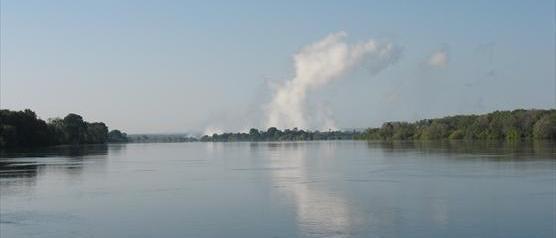
Zambesi river just before the Victoria Falls,
or Mosi-oa-Tunya "smoke that thunders". Photo: Marja Pylvänäinen © Photo: Marja Pylvänäinen
Project Description:
The project was financed through the Institutional Cooperation Instrument (ICI) of the Ministry for Foreign Affairs of Finland, the purpose of which is to strengthen the capacity of public sector institutions in partner countries. The ICI Project of SYKE in Zambia consisted of five components with different objectives, contents and partner organisations. After the Zambian elections in September 2011, the implementation of the Project was suspended as the Zambian ministries were realigned and the partner ministry (Ministry of Tourism, Environment and Natural Resources, MTENR) was dissolved. After signing of a new Memorandum of Understanding between the MLNREP and SYKE in August 2012 and the preparation of a new work plan in November 2012, it became possible to continue the Project implementation in 2013-2014.
1) Human Resources Administration, Management and Development (HRAMD)
The objective was to support the capacity building in the HRAMD functions of the MTENR and its statutory bodies, for example, through joint development of their human resources information systems and human resources development plans. A professional visit to Finland was organised in June 2010 and another one to Zambia in November 2010. Through these Visits the partners were familiarised with each other’s HRAMD systems and situation, and joint needs assessment and planning was carried out. In 2011 various materials were prepared, translated and sent to the MTENR for the HRD planning.
2) Environmental Information Management (EIM)
The aim was to strengthen the management of environmental information in all phases of the information production and utilisation chain in Zambia by supporting the upgrading of the ICT infrastructure, assessment of existing information, preparation of data harmonisation and sharing policy and strategy, planning of an integrated environmental information management system (extranet portal), and capacity building in remote sensing. Professional visits were organised to Finland and Zambia, and the partners participated jointly in ESRI Europe, Middle East and Africa User Conference in Rome in October 2010 to familiarise with different Geographical Information Systems (GIS) solutions and to network with other African GIS users. In addition, the cooperation continued in 2011 by commenting Zambia's plans for ICT management in the environmental administration and translating Finnish EIM and data sharing policies and strategies into English as examples. Following the enactment of the Environmental Management Act, No. 12 of 2011, the Zambia Environmental Management Agency (ZEMA) was mandated to coordinate the management of environmental information in the country. Therefore the cooperation in environmental information and ICT infrastructure continued with ZEMA in 2013. Capacities of relevant ZEMA experts were strengthened in environmental information management, particularly geographical information systems (GIS), remote sensing (RS), meta-data and database solutions, data sharing and planning of the environmental information register. In 2014, comments and proposals on the development of the ICT Policy and Guidelines of ZEMA were provided and a professional visit to Lusaka was organised, focusing on ZEMA’s environmental information and ICT infrastructure, the development of a Licensing Information System (LIS) and planning of the LIS database structure, and the development of the Environmental Register.
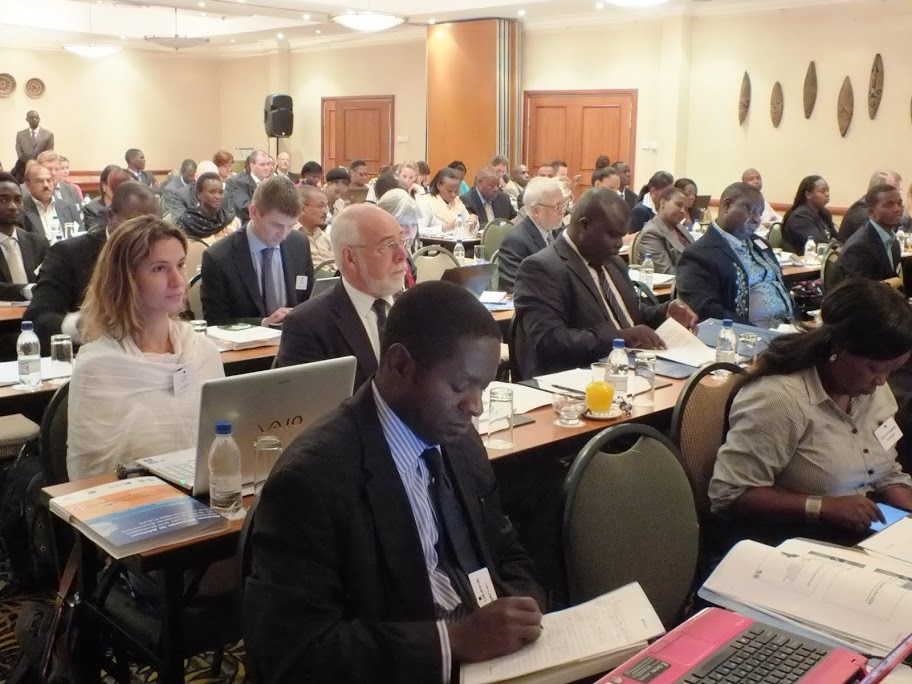
Regional Workshop on SEA and Green Economy in Lusaka, January 2013 © Matti Nummelin
3) Strategic Environmental Assessment (SEA)
The objective was to contribute to building capacity for SEA in Zambia by exchanging international experiences, developing Zambian SEA guidelines and providing training for "SEA Champions" and SEA trainers of the Environmental Council of Zambia. The first SEA Champions training was organised in Zambia in October 2010. In 2011, a study on international SEA experiences was finalised and comments on the Zambian SEA Guidelines were provided. In addition a professional visit to Finland for four Zambian experts was organised in October 2011. Based on an initiative of the OECD/DAC/Environet SEA Task Team, a Regional Workshop on SEA and Green Economy was organised in Zambia in collaboration with the MLNREP and ZEMA in January 2013.
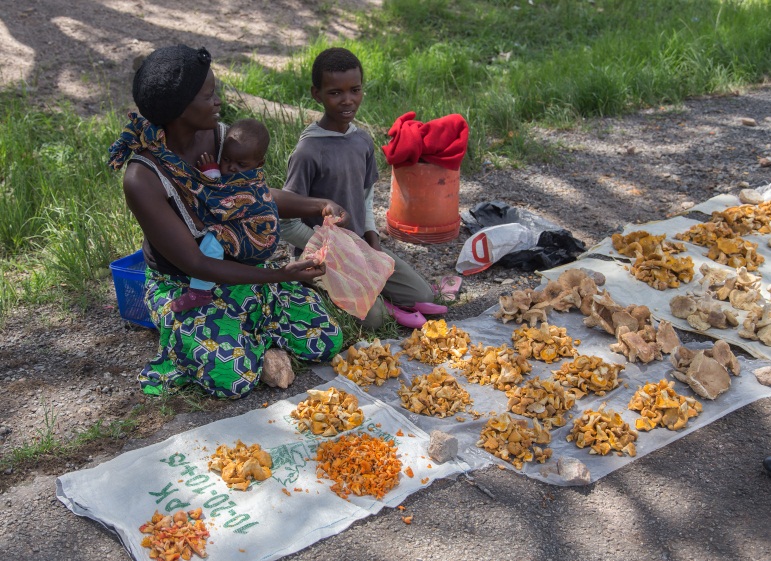
Young Zambian mother selling mushrooms along a road © Heikki Kotiranta
4) Biodiversity and Trade of Endangered Species Conventions
The objective was to strengthen the capacities of the Zambian national focal points of the international biodiversity (CBD) and trade of endangered species (CITES) conventions. A group of Zambian experts visited Finland in August-September 2010 and got acquainted with the administration of the conventions in Finland. In 2011, the cooperation focused on assessing the existing biodiversity information and data, particularly the CBD Clearing House Mechanism (CHM), supporting the development of the CHM and supporting the CITES national focal point. In 2013-2014 the main focus was on the preparation of a Guidebook on Zambian edible and poisonous mushrooms which was published in May 2015 (Marja Härkönen, Tuomo Niemelä, Keddy Mbindo, Heikki Kotiranta & Graham Piearce 2015: Zambian mushrooms and mycology. — Norrlinia 29: 1–208. ISBN 978-951-51-0852-4). In addition, a "Scoping study on supporting diverse agro-forestry" was undertaken to investigate the potential of native tree species for Zambian forestry development and the ways to support diverse agro-forestry in Zambia: production of fruits, caterpillars, seeds, medicinal plants and edible mushrooms and other edible non-wood forest products which are underpinning biological diversity and providing nutrition, food security and livelihood for local people.
5) Persistent Organic Pollutants (POPs) and Stockholm Convention
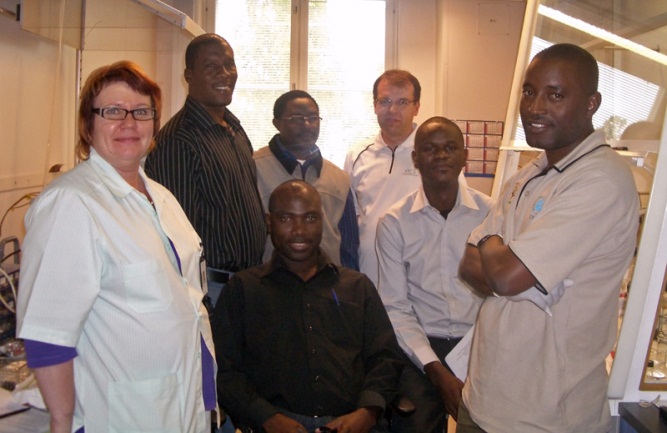
Chemicals experts in SYKE laboratory © Maria Johansson
The objective of this Component was to build capacity to analyse and gather information on the chemical contamination of the environment in Zambia by training the personnel and enhancing the technical capacities of ZEMA and three Zambian laboratories. In 2011, five Zambian chemicals/laboratory experts were familiarised with the POPs monitoring in Finland and type of laboratory equipment and methods used at SYKE's laboratory and trained hands-on in sample preparation, extraction, analysis and interpretation of the results. The participants brought with them the study material for the training, i.e. fish and sediment samples from the Kafue River, thus giving – as far as known – the first information on presence of POPs in Zambian environmental samples. Subsequently, a laboratory needs assessment was prepared by the Zambian participants and assessed by SYKE laboratory experts, including a list of equipment and materials that should be procured to make a laboratory in Zambia capable of analysing the POPs. In 2013 a laboratory was equipped for the priority POPs analyses and in March 2014 SYKE’s team organised a hands-on training course in Zambia for the relevant experts on sampling and analytical procedures, result calculation and interpretation, and continue to build up the knowledge on Zambian contamination levels. The training of the laboratory personnel in sample preparation and analyses continued by organising a training period in SYKE’s laboratory in October 2014. The training concentrated on sampling and analytical procedures, result calculation and interpretation. The trainees are now able to independently collect samples and prepare them for the laboratory analysis according to international practices ensuring efficient use of analytical resources.
Services provided by SYKE
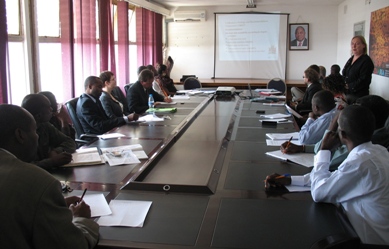
Biodiversity, CITES and ICT experts from Zambia and Finland meeting at the Ministry of Tourism, Environment and Natural Resources in Lusaka, April 2011. © Marja Pylvänäinen
The idea of the ICI is that capacity can be best enhanced with the help of colleagues from a respective organisation with similar tasks and responsibilities. Therefore the ICI projects are based on cooperation between civil servants of two countries. In the ICI project with the environmental administration of Zambia, more than twenty SYKE experts of the relevant fields participated in the cooperation.
More Information
Mr. Pekka J. Salminen, Project Manager, International Affairs Unit, Finnish Environment Institute